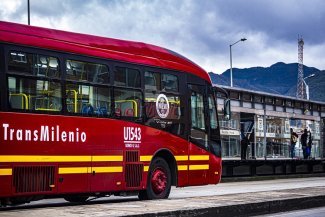Faced with severe labour shortages throughout the 1970s, in 1978 East Germany came to an agreement with its communist ally Mozambique that would result in 16,000-20,000 Mozambican workers migrating to the German Democratic Republic (GDR).
Although similar labour export policies were implemented with other communist governments in Asia and Africa, this struggling former Portuguese colony was promised brand-new machinery and foreign revenue in exchange for coal and labourers.
The Mozambican migrant workers would also learn new skills to help plug the gap left by the thousands of Portuguese settlers who left the country when Mozambique gained its hard-fought independence in 1975.
Amongst these workers were nearly 9,000 young men and women; officially they were 18 years and older, but young teenagers often pretended to be older to take advantage of what was sold to them as a once-in-a-lifetime opportunity.
They were sent to East Germany under the pretext that they would receive a prestigious education that would allow them to work in Europe when they completed their studies, earning salaries they couldn’t even dream of in Mozambique.
The reality, however, was something different.
“We didn’t even realise there were two Germanys,” says Ibraimo Alberto, who was sent to GDR as an 18-year-old in 1981 from a cotton farm in Chimoio, western Mozambique.
“My father was a traditional herbalist. I washed clothes on a farm owned by a Portuguese settler, who pressurised me to go,” says Alberto, who at 53 is now a celebrated former boxer, author, social worker and a German citizen.
“You must realise it was bewildering. I was a teenager sprung from rural Mozambique, flying with no family to Berlin-Schoenefeld airport.”
Alberto says he was one of about 200 fellow young migrants from Angola, Mozambique, Mongolia and Poland. “We were ferried by military lorries, our passports were seized and we were dumped in a compound in East Berlin.”
Marcia Schenck, a PhD scholar at Princeton University in the US, is finishing a thesis on the issue and has examined migrant worker labour disputes in southern Africa. “This was the beginning of what I call ‘international confusion’. East Germany thought it would get skilled technicians, not teenage boys,” she says.
The arrangement was part of a wider policy, as described by researcher Bill Paton in his book Labour Export Policy in the Development of Southern Africa. For adult Mozambicans sent to the German Democratic Republic, “only a small number of returnees ever found employment befitting their GDR training.”
Conditions were harsh. Free movement was curtailed and mingling with local Germans was discouraged, as were interracial marriages. “We were not allowed to travel until four years passed,” Alberto tells Equal Times.
Even their days off were accounted for. “Sunday was for communist propaganda youth clubs. Failure to attend would lead to victimisation and suspicion,” says Alberto.
Mozambican girls who fell pregnant were pressurised to have abortions or their babies were adopted and the girls deported, says Alberto, who tells his dramatic life story in a book titled Ich wollte leben wire die Götter (I Wanted To Live Like The Gods).
Painful labour
Like many others, Alberto endured years of back-breaking work in East Berlin and the eastern town of Schwedt (near the Polish border).
“My job was cutting dead animals into pieces in a pig slaughterhouse. Others were sent to coal mines or to work on the railways. I worked from six in the morning until five in the evening every day. From 21.00 until 0.00, I would attend German lessons,” he says.
Today Alberto’s arms still bear the scars from the electric blades that missed the necks of pigs and instead cut and bruised the wrists of this untrained Mozambican laborer.
“It was such a deathly risk to cut pork with electric scissors for the first time in Germany,” says Alberto. “All I wanted was to study sports science,” which is what he was promised when preparing to travel to Germany. Instead, on arrival, he was told he was there to be a factory worker.
“We were angry and we wanted to return instantly to Mozambique,” he says. But they were pressurised into staying. “Our government threatened to jail us for 15 years if ever we absconded from East Germany.”
Even Germany´s current ambassador to Mozambique, Philipp Schauer, acknowledges how difficult these migrant workers lives were. “The labourers are right in saying the work was way too tough. It was.”
On paper, the migrant labourers were to receive 1000 marks a month – the same salary as East German workers. But in reality, they only got 300 marks, as the remainder was sent back to the Mozambican government. The labourers were promised that the money would be held for them so that they could receive a lump sum of about US$5,000 upon returning home – but it never happened.
One theory is that the tens of millions owed to the labourers was appropriated by government officials. Another theory is that the money was ploughed into supporting the then-fledgling national bank, Banco de Moçambique. Either way, to this day, most of the migrant workers who returned to Mozambique haven’t received a cent more than what they were paid in while in the GDR.
Such is the case for Alberto, who returned to Mozambique with ten others in 1985, hoping to receive the rest of his wages; the government refused to pay them. Grappling with one of Africa’s messiest wars, the authorities told the returnees to go back.
“A provincial minister told me: ‘Your money is on the way from East Germany. If it arrives we will keep it for you. But you are still young. Return to Germany; we still need our contracts with them.’ So we said, ‘Ok. Let’s return, let´s work on’”.
Although most of the returnees are now too poor, too tired and too jaded to pursue their claims, today if you visit the Mozambique capital of Maputo, every Wednesday in the city centre you will see scores of people protesting, calling on the government to pay them the money they are owned. They have been there since 1991. They are still waiting.
Deportation after German unification
In 1991, East and West Germany reunited and communism was on the decline worldwide. “The labourers, their presence, became some sort of diplomatic embarrassment in the eyes of the hosts,” says Schenck.
Thousands of labourers were deported from East Germany back to Mozambique, some against their will. “But I was allowed to remain because I was a good boxer,” Alberto says. “I was given a paper that said you can fight for Germany but you can’t vote. I boxed till 2000 and won many trophies.”
In 1991, Alberto married a German citizen and then went on to finish his studies. He became a social worker before finally becoming a German citizen himself in 1994.
Bernado Maffuse, his colleague, now 59, was not so lucky. He and 500 other Mozambicans in his group were deported.
“In 1991, I left two sons behind in Leipzig – until this day I have not seen them. This eats me up,” Maffuse tells Equal Times. “On our arrival in Mozambique, our money was not forthcoming. ‘Your money is still coming from Germany,’ said the authorities back home.” They have been saying this to Maffuse and his peers for the last 25 years.
The Mozambique Ministry of Labour refused to reply to any questions from Equal Times, but according to an article published by IPS News in 2012, documents prove that US$74.4 million was paid by the GDR government in salaries directly to the Mozambique government, in addition to US$18.6 million in social security contributions.
Mozambique has since made a few payments (of between US$370 and US$550 each) to some of the returnees but this falls far short of the thousands of dollars owed to each worker.
Suez Madolo is a human rights lawyer who is advising ten returned labourers with the help of Mozambique’s national trade union centre, the Organizacao dos Trabalhadores de Mozambique. He says: “Some workers got just US$500 right at the airport in Mozambique and their claims papers were torn up. Some were lied to and told that family members had already claimed their wages.” Each of his clients is demanding a minimum of US$8,000.
Shame and outrage
Returned workers like Maffuse, now in their fifties, dozens already dead, continue to live in limbo in Mozambique today. Separated from the children they sired in Germany, many are devoured by alcoholism, blighted by poverty and surrounded by the intense communal shame of being unable to call themselves German or Mozambican. Instead they are known locally as magermans, meaning those who came from Germany.
Ambassador Schauer agrees that the labourers’ homecoming “was very difficult. They feel they are not welcome.”
Mozambique’s political elites react strongly to those who raise the issue. Some people have been jailed and the government recently rebuked Ambassador Schauer for attempting to discuss the issue with Mozambique’s leading independent news weekly, Savana.
When asked his opinion on the issue, an eminent politics professor at one of Mozambique’s top universities refused to comment. “It’s a hot potato,” said the professor, who asked not be named. “I was severely warned last month for chatting about this story. Sorry, but I don’t feel safe helping you,” he said, pointing to the as-yet-unsolved assassination of the prominent human rights activist Professor Gilles Cistac in 2015 outside a restaurant in Maputo as evidence of the dangers of being too outspoken in Mozambique.
However Alberto, who toured Mozambique last year with the German foreign minister´s delegation, is determined to fight on, despite the ‘advice’ of the authorities.
“The Mozambique government told me: ‘We can’t process your request. You are now a black German – it’s too late.’” But as long as Mozambique’s magermans are still breathing, the fight for justice will continue.









